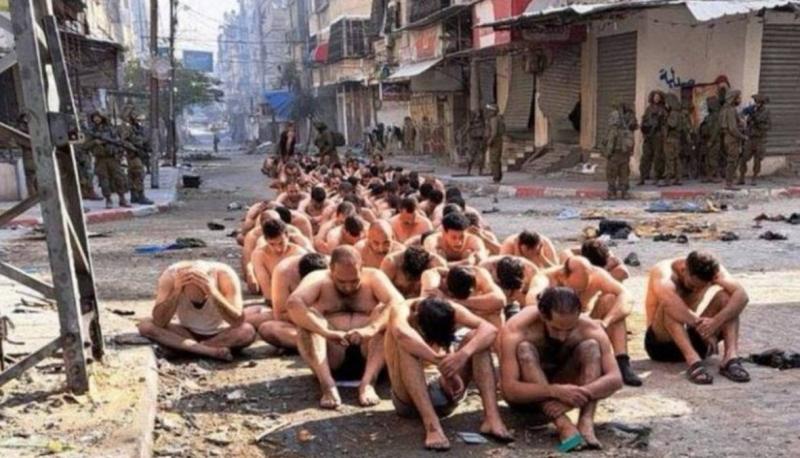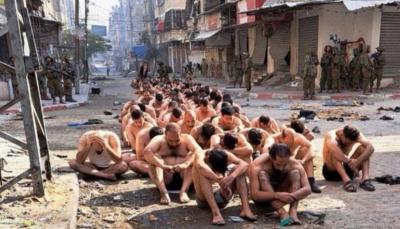An Israeli doctor revealed crimes being committed against Palestinian prisoners from Gaza held in a prison in the Negev Desert. According to a report by the Israeli newspaper "Haaretz" on Thursday, the doctor stated that Israeli authorities "commit legal violations in a secret prison in the Negev." The report explained that the doctor's revelations were contained in a letter delivered last week to the Minister of Defense, the Minister of Health, and the legal advisor to the Israeli government, where he described the treatment of Palestinian prisoners held there.
According to the Israeli doctor's testimony, Israeli authorities endanger the health of Palestinian prisoners from Gaza, and the state risks violating the law. He noted in his letter that "this week alone, two patients underwent amputations of their legs due to the effects of shackles, and unfortunately, this has become a routine event." He added that detainees are fed on herbs, defecate in diapers, and their hands are constantly restrained, which are conditions that violate medical standards and international law, according to the Israeli newspaper.
The camp at Sde Teyman was established immediately after the war began, intended to detain Hamas elements, including elite members who participated in the October 7 attack, before transferring them to prisons. At the war's outset, the Knesset approved an amendment to the prisoners and detainees law, which also includes details about the conditions under which they are supposed to be held. Since the ground entry into the Gaza Strip, most detainees arriving at Sde Teyman base from the territory are interrogated on suspicion of involvement in "terrorism," although many are released after it is determined they have no connection to "terrorism."
"Since the early days of the medical facility's operation until today, I face difficult ethical dilemmas. Furthermore, I write to warn you that the characteristics of the facility's activities do not comply with any health provisions in the law concerning the detention of unlawful combatants," the doctor wrote. He noted that the hospital does not receive regular supplies of medications and medical equipment, and that all of its patients are shackled, and regardless of the severity of their conditions, they are blindfolded and fed with straws. "Under these circumstances – in fact, even small and healthy patients lose weight after about a week or two of entering the hospital," according to the newspaper.
An Israeli army spokesperson stated that detainees receive food according to their health needs and can access toilets based on their medical conditions. While their movement is limited, the army claims that diapers assist them. A senior source in the Ministry of Health claimed that the treatment of detainees while shackled began after a sick detainee attacked members of the medical staff.
As a general rule, detainees at Sde Teyman are restrained by their hands throughout the day and blindfolded. According to the doctor, over half of the patients in the hospital are there due to injuries sustained during detention, due to shackles and prolonged standing. The doctor stated that the shackling causes serious injuries "requiring repeated surgical interventions."
The Israeli army spokesperson stated that the method of shackling is determined "in accordance with the law and based on individual assessments of each detainee's threat level, aiming to ensure the security of the forces and medical staff." He also mentioned that the decision to restrain a detainee takes into account their health status and the recommendations of medical staff. According to the army, following injuries, the type of shackles used in the facility was changed, and guards ensure there is space between the detainees' bodies and the shackles. "Haaretz" learned that after a few months, the plastic handcuffs that were used to restrain detainees' hands were replaced with metal cuffs.
In addition to the doctor's testimony, three sources testified to "Haaretz" that at the beginning of the war, one detainee's hand was amputated due to being restrained in plastic handcuffs for a prolonged period as a result of injury. An Israeli army spokesperson stated that an investigation into the incident will be conducted, and since there was no suspicion of criminality, it was decided not to open an investigation for the Israeli army.
A source speaking to "Haaretz" indicated that many detainees are in poor physical condition. Some were injured in battles or during the war, and sometimes their injuries worsened due to prison conditions and lack of hygiene. Others suffer from chronic illnesses. He noted that for several months since the war began, there has been a lack of medication for chronic diseases in the facility, and some detainees suffer from prolonged seizures. The source stated that despite many detainees having medical issues, most are not treated in the hospital but remain in the yard and receive treatment from paramedics. Sources speaking to "Haaretz" noted that the supply of medication for chronic diseases has increased since then. The same source mentioned that many detainees' hands were cut and infected due to the shackles, supported by images of released detainees in Gaza showing wounds on their hands.
The Palestinian detention camp in the Gaza Strip consists of cages where detainees are held and a field hospital. According to sources, between 600 to 800 residents of Gaza were immediately detained, with a few, who needed urgent medical treatment, in the hospital, where conditions are the same as described in the doctor's letter. Some detainees in the facility are later transferred to prisons in Israel, while others are returned to Gaza after interrogation if no reason is found to continue their detention. According to data from the Israeli Prison Service provided by the organization "Hamoked" for individual protection, the number of detainees in Gaza prisons as of April 1st was 849, in addition to those detained at Sde Teyman.
The field facility in the detention center is supposed to operate under the amendment to the unlawful combatants' detention law that the Knesset passed last December. The doctor noted in the letter that the facility's operation does not comply with the stipulated conditions in the law, including granting the right to medical treatment according to the health status of inmates, their right to be held in hygienic conditions, their right to have proper sleeping arrangements that do not endanger their health or dignity, as well as their right to walk for about two hours daily in the open air.




